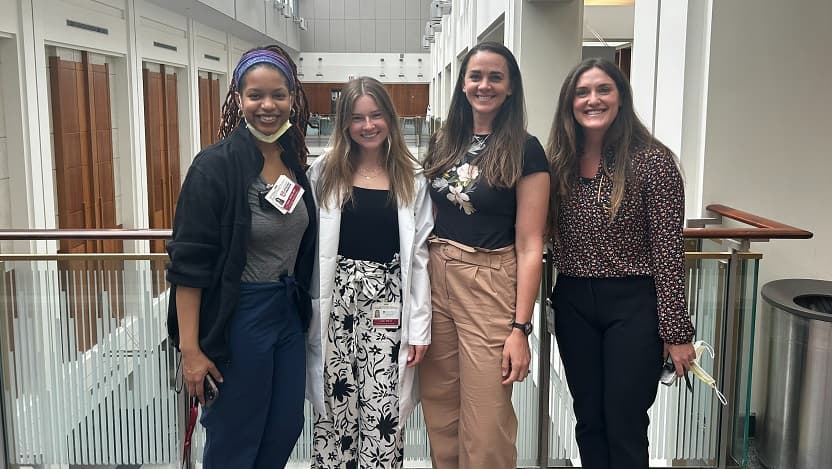Clinical research roles open doors to healthcare opportunities

If your cancer care or career has included a clinical trial, you are likely familiar with clinical research coordinators (CRCs): staff whose work takes them around hospitals and clinics to talk to patients about clinical trials, explain specific protocols and ensure that those who choose to participate have their questions answered.
At the University of Chicago Medicine, CRCs’ work has an undeniable impact on our ability to provide cancer care to all patients that is truly at the forefront of oncology. The work is also very fulfilling for those who take it on. As Walter Stadler, MD, Dean for Clinical Research, puts it: “The CRCs are the glue that allows us as researchers to conduct a clinical trial. They are the unsung heroes who make sure the research is accurate and the patients are safe.”
For some, a role in clinical research is also a chance to understand the inner workings of a prominent academic medical center’s activities and launch themselves into a career directly involved in patient care.
“There are so many exciting career paths in the field of clinical research: data management, clinical research coordination, regulatory — the list goes on,” said Lauren Wall, MS, Senior Director of the Cancer Clinical Trials Support Office. “Our team is dedicated to advancing science and medicine for our patients. Our team focuses on trials spanning screening, prevention, treatment and improving quality of life. No matter what role employees have, they are all passionate about the impact of their work on our mission.”
For many CRCs, working in clinical research is their first exposure to the wide variety of clinical roles that make a system like this one run. Jackie Peterson, MSN, RN, OCN, who now serves as a nurse manager at UChicago Medicine’s Orland Park location, shared that connecting with nurses during her time in research not only helped her realize nursing was the right profession for her but also gave her the inspiration and confidence she needed to return to school.
Julie Gruszczynski, PA-C, Alexis Small, PA-C, and Amanda Krug, PA-C, all physician assistants (PAs), found their paths while spending time with clinical teams and observing how PAs interacted with their patients. Krug even returned to UChicago Medicine for a clinical rotation, shadowing oncology PA Carolyn Culberg, MMSPA, to learn more about the ins and outs of oncology care she didn’t see during her time in research.
“You see more than just the patient interactions of each profession — you see their work outside the clinic and learn what their days and workflows are like,” Krug said. This information can be crucial for determining which field is the right fit.
The skills learned as a CRC are often incredibly useful in clinical work. Tyler Crump, MSN, RN, MPH, a former Senior Clinical Research Data Manager and current nurse navigator in the gynecologic oncology program, said that what she learned in research comes up often in her clinical work.
“There are a lot of clinical trials for gynecologic oncology, so I use my experience in that area to be really upfront and clear about how clinical trials work and help patients know what to expect,” Crump said.
As Peterson, the nurse manager in Orland Park, has moved from frontline nursing to management roles, her clinical trials foundation has proven useful. At first, she was able to help patients understand clinical trial processes, and now she can help her staff better understand and explain those same systems and processes.
For many people, their time as a CRC at UChicago Medicine is so formative in launching a clinical career that they return to the institution in their new roles — sometimes even to the same teams they worked with on clinical trials.
“Training a CRC is an investment in the future of cancer care,” said Sonali Smith, MD, Chief of the Section of Hematology/Oncology. “The more people there are who understand the nitty gritty details of high-quality research, the faster we can move towards better cancer care for all.”
Alexis Small, PA-C, started in 2014 as a CRC on the Transplant & Cellular Therapy team; in early 2020, she returned to the same team in her new PA role. Similarly, Meghan Catenacci, MS, BSN, RN, knew the genitourinary oncology team was the right one for her after working in clinical research with them since 2010, so she rejoined them when she came back to practice clinically at UChicago Medicine in 2021. “It felt like coming home,” she said.
For current CRCs considering pivoting to a clinical care career one day, the advice from these researchers-turned-clinicians was unanimous: take advantage of all the support and expertise around you.
“If the team knows a CRC wants to become a clinician, everyone is happy to make connections, share advice or answer questions,” said Small.
Catenacci agreed, sharing that everyone wants to help interested CRCs find the right clinical path for them. “There isn’t one right path; there are many,” she said.
Director of Clinical Research Operations Sara Moellering said, “Clinical research is a great opportunity for individuals to launch their career in clinical research or to gain insight into the different clinical paths they could pursue — including nursing, APN, APP and MD — while gaining invaluable interactions with patients.”
Whether a CRC finds their path within the research world or transitions to a clinical one, their work is essential to the innovation UChicago Medicine is known for. Happy Clinical Trials Awareness Month and Cancer Research Awareness Month to all!

Clinical Research Coordinator Role
The Clinical Research Coordinator (CRC) is a key team member working with the lead physician researcher, known as the Principal Investigator (Pl), to support medical research activities. This person performs an important project management role.
Learn more about the CRC role and see job opportunities here